Shaft Blu-ray Movie
HomeShaft Blu-ray Movie 
Warner Bros. | 1971 | 100 min | Rated R | Aug 14, 2012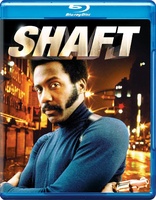
Price
List price:Amazon: $14.49 (Save 27%)
Third party: $14.49 (Save 27%)
Temporarily out of stock.
Movie rating
6.9 | / 10 |
Blu-ray rating
| Users | 4.5 | |
| Reviewer | 4.0 | |
| Overall | 4.0 |
Overview
Shaft (1971)
Follows the investigations of legendary, Black private detective—one bad mutha—Shaft! Donned in a turtleneck and leather jacket, he's not only an undercover hero, Shaft's also a lean, mean, sex machine, for all to admire...
Starring: Richard Roundtree, Moses Gunn, Charles Cioffi, Christopher St. John, Gwenn MitchellDirector: Gordon Parks
| Crime | Uncertain |
| Film-Noir | Uncertain |
| Thriller | Uncertain |
| Action | Uncertain |
Specifications
Video
Video codec: MPEG-4 AVC
Video resolution: 1080p
Aspect ratio: 1.78:1
Original aspect ratio: 1.85:1
Audio
English: DTS-HD Master Audio Mono (48kHz, 24-bit)
French: Dolby Digital Mono
German: Dolby Digital Mono
Spanish: Dolby Digital Mono (Spain)
Spanish: Dolby Digital Mono
Subtitles
English SDH, French, German SDH, Japanese, Spanish
Discs
25GB Blu-ray Disc
Single disc (1 BD)
Playback
Region free
Review
Rating summary
| Movie | 3.5 | |
| Video | 4.5 | |
| Audio | 3.0 | |
| Extras | 3.0 | |
| Overall | 4.0 |
Shaft Blu-ray Movie Review
Still One Bad Mothahfu . . . (hush your mouth!)
Reviewed by Michael Reuben August 16, 2012It would be impossible to overstate the impact of Gordon Parks's original Shaft when it first appeared on movie screens in 1971. Private investigator John Shaft didn't do anything audiences hadn't seen before. He openly defied the cops, beat down anyone who got in his way, handled firearms with aplomb, bedded any woman who caught his fancy and came out a winner in the end. But Shaft was African-American, and in 1971 much of white America was still unsettled by confident, self-possessed black men who refused to "know their place". Just the year before Shaft's release, a Vietnam veteran named Dickie Morrow had been publicly executed in Oxford, North Carolina, by relatives of a white woman who claimed he'd been "rude"; his killers were acquitted by an all-white jury, despite eyewitness testimony. (The incident and its aftermath are the basis for the film Blood Done Sign My Name.) In a country where such things could still happen, the sequence in which Shaft picks up a white woman at a bar and takes her home for the night, only to have her accuse him of being "shitty" the next morning, was as loaded as they come—even more so when Shaft and his police lieutenant buddy, Androzzi, turn her complaint into a running joke. The Black Panther Party was still active then, and many feared it. Having Shaft not only routinely brandish firearms, but also recruit militants to assist him in rescuing a kidnapped mobster's daughter, was like jabbing a finger into a cultural sore spot. Both director Parks and screenwriter Ernest Tidyman (adapting his novel with the help of John D.F. Black, an experienced TV writer) knew exactly what they were doing. The film's tone is set immediately during Shaft's famous swaggering stroll through Times Square, to the sound of Isaac Hayes's Oscar-winning theme, when he gives the finger to a motorist, saying "Up yours, baby!" Add Hayes's Oscar appearance to the list of shockers; the TV audience had never seen anyone with his dark skin, cueball head and gold chains accepting an Academy Award. Shaft's age is evident both in its suroundings and costumes and in its cinematic style. The Steadicam hadn't yet been invented, which meant that Parks couldn't follow his hero closely through the urban landscape that was Shaft's natural habitat, and editing hadn't yet been transformed into the rapid-fire style that would appear in the next decade with music videos. Besides, Parks came from the world of still photography. A founder of Essence magazine and a veteran of Life, Parks generally composed a frame, let the actors perform within it (plus wherever the camera could tilt or pan), then let his editor, Hugh A. Robertson (Midnight Cowboy), construct the scene. The result might be considered stately and slow except for two things: the charismatic performance by Richard Roundtree in the title role, and Isaac Hayes's unforgettable soundtrack, which feels both timeless and of its time. Together, these two intense presences still conspire to pull a viewer into the film, even today.

New York P.I. John Shaft (Roundtree) is on his way to his office when he gets a tip that two hoodlums are looking for him. Not wanting to be unpleasantly surprised, Shaft manages to ambush the pair, which results in a scuffle that lands him in the office of NYPD Lt. Vic Androzzi (Charles Cioffi). Androzzi is the closest thing Shaft has to a friend on the force—and they aren't that friendly. In a classic exchange that captures the tenor of their relationship, Androzzi holds up a black pen to Shaft's face and says, "You ain't so black." To which Shaft responds by holding a white coffee mug next to Androzzi's face, saying: "And you ain't so white either, baby." (Shaft calls everyone "baby".) Androzzi has been hearing rumors of something big and potentially dangerous, and he wants Shaft to tell him what it is. Shaft says nothing, because at this point he doesn't know (which he won't admit either; it would be bad for his image). He does know that the hoods who came for him work for a Harlem crime boss known as Bumpy Jonas (Moses Gunn). (The name is a tribute to Harlem gangster Bumpy Johnson, who died in 1963 and has appeared as a character in Hoodlum and American Gangster, among others.) Shaft makes Bumpy come to him, which he does, accompanied by his resentful right-hand man, Willy (Drew Bundini Brown, one of Muhammad Ali's trainers). Bumpy says that his daughter, Marcy (Sherri Brewer), has been kidnapped, with no ransom note and no demands. He wants Shaft to find her. Bumpy suggests inquiring among a radical group that opposes his criminal activities for political reasons. Shaft can sense that he isn't getting a straight story, but he takes the job and tracks down Ben Buford (Christopher St. John), an old friend from the neighborhood who is now a leader of the radical group. (Watch for Antonio Fargas, a future regular on Starsky and Hutch, as one of the Harlem characters Shaft pays for information on Buford's whereabouts.) But Shaft is being tailed, and his meeting with Buford is ambushed by gunmen. Shaft and Buford escape, but others aren't so lucky. What Shaft can't decide is whether he or Buford was the target. After Lt. Androzzi questions him again, Shaft confronts Bumpy and learns that he's been drawn into a war between Bumpy's operation and the New Jersey mob, a war in which Bumpy's daughter has become a pawn. Buford wants no part of this, but to Bumpy's great amusement, Shaft is able to persuade Buford of the economic benefits of assisting Bumpy on a temporary basis. With backup now secured, Shaft begins planning a daring rescue that plays something like "Mission: Impossible" on a shoestring budget. The iconic image used on one-sheets of Shaft grasping a rope and firing a gun is taken from that climactic sequence. If he'd been born twenty-five years later, Richard Roundtree might easily have become an international movie star. Much of the success and durability of Shaft are due to Roundtree's screen presence and intensely physical portrayal of the title character. Unfortunately for Roundtree, he was so effective in the role that he became typecast, and after the brief era of so-called "blaxploitation" films that Shaft helped inspire—a concept from which director Parks tried, in vain, to disassociate himself—there was little work as a leading man for an African-American actor in the Seventies and Eighties. After two Shaft sequels and a short-lived TV series, Roundtree kept busy with supporting work in film and TV, where his range can be seen in such roles as the buttoned-down D.A. in Se7en, the stylized school principal in Rian Johnson's Brick, the elderly Hardy Lester in Soul Food and, of course, the elegantly retired version of John Shaft, uncle to Samuel L. Jackson's version, in the 2000 remake. Then again, Roundtree isn't solely responsible for turning himself into Shaft. Not since Monty Norman penned James Bond's signature theme has a musician so thoroughly embodied a character in a series of notes as Isaac Hayes did with Shaft. Once heard, the theme is hard to forget, and in the summer of 1971, it was everywhere. Just play a few seconds of it, and anyone who's seen the movie can visualize Roundtree's Shaft striding through Times Square, long leather coat flapping in the wind.
Shaft Blu-ray Movie, Video Quality 
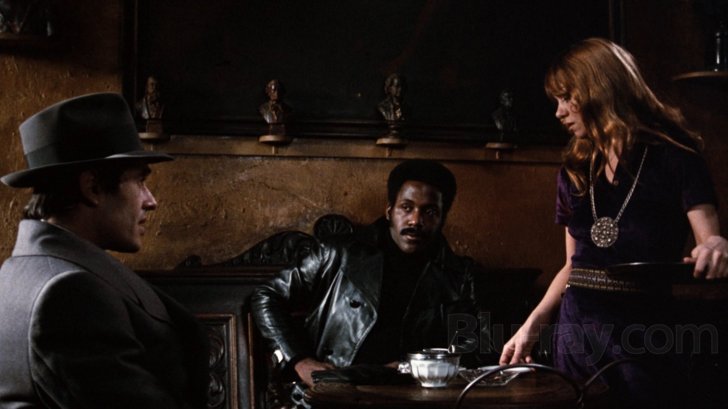
Shaft's tiny production budget is reflected in its image, but Warner's 1080p, AVC-encoded Blu-ray offers a remarkably faithful reproduction of the film's original look. The source material is in fine shape, which is especially noteworthy when you consider that most audiences in 1971 saw prints that had been run through projectors repeatedly and taken quite a beating by the time they reached the second or third week of exhibition. Swiss cinematographer Urs Furrer (whose career was cut short by a fatal heart attack at age 40) was a veteran of documentaries and industrial films, which made him ideal for shooting Shaft in largely natural light in the many real locations in and around New York City where the production filmed. If you don't like grain, you won't like this Blu-ray—and you also don't like film, because this is what film of this vintage looks like when shot under such conditions. The same emulsion that created the grain also captured substantial detail (light permitting), and reducing the grain would be difficult to do without losing detail. Even if you could keep all the image information with sophisticated software, the degrained result wouldn't look like Shaft. This Blu-ray does. Blacks are deep and inky, which is critical in certain night scenes, e.g., when Shaft and Buford are fleeing gunmen. Director Parks and his DP place the two men in deep shadow as they hide, with only a small amount of light falling on their faces; it's a painterly composition that requires solid blacks for its effect, and the Blu-ray delivers. Colors are generally cool, flat and dull, consistent with the wintry season and crumbling city infrastructure, but there are exceptions (e.g., the apartment of Shaft's girlfriend). The film runs under two hours; the soundtracks are all mono; and the extras are all standard definition. As a result, Warner has managed to get away with a BD-25 without compression issues. My video score for this title is based on fidelity to the source and a remarkable job with difficult material.
Shaft Blu-ray Movie, Audio Quality 
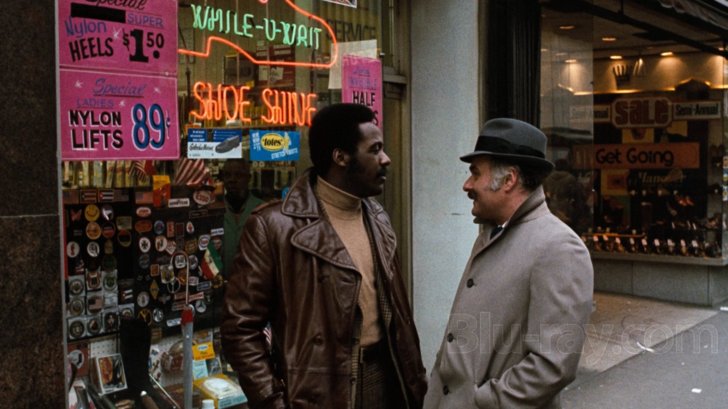
The film's original mono soundtrack is presented as DTS-HD MA 1.0, and there isn't much to say about it other than that it adequately reproduces the film's original mix, with decent dynamic range for the Isaac Hayes score and clarity for the film's dialogue. This is all one can ask from a good mono track.
Shaft Blu-ray Movie, Special Features and Extras 
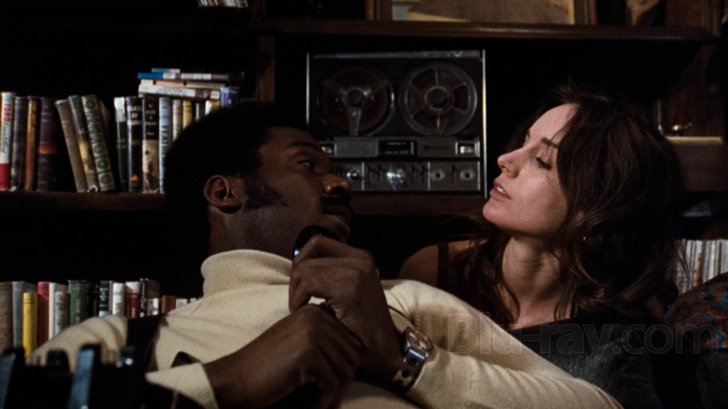
The supplements have been ported over from the 2000 DVD, with one addition.
- Behind the Scenes Documentary: Soul in Cinema: Filming Shaft on Location (SD; 1.33:1; 10:50): This is much better than the usual EPK-style promotional piece, because it doesn't feature a hard-sell voiceover, but simply provides a close look at Roundtree and Parks working on scenes, as well as Parks and Hayes developing the soundtrack and Parks and editor Robertson working on fine-tuning the action.
- Trailers (SD; 1.78:1, enhanced)
- Shaft (3:13)
- Shaft's Big Score! (3:07)
- Shaft in Africa (3:01)
- Shaft: The Killing (1973 TV Episode) (SD; 1.33:1; 1:13:46): This is the new extra. Following the release of the third Shaft film in 1973, CBS greenlit a series of TV movies featuring John Shaft, which ran on Tuesday nights alternating with a series called Hawkins, featuring Jimmy Stewart as a country lawyer. Neither series was a success, in part because they appealed to vastly different audiences. Also, many of the qualities that made John Shaft distinctive and appealing were not TV-friendly and had to be toned down. This episode ran on Oct. 30, 1973, and follows Shaft's efforts to free an old flame from the clutches of an abusive pimp. When the pimp is found beaten to death, Shaft is arrested for his murder. The source material is in somewhat rough shape, but Warner is to be commended for providing this supplement, which makes for an interesting contrast with the original film.
Shaft Blu-ray Movie, Overall Score and Recommendation 
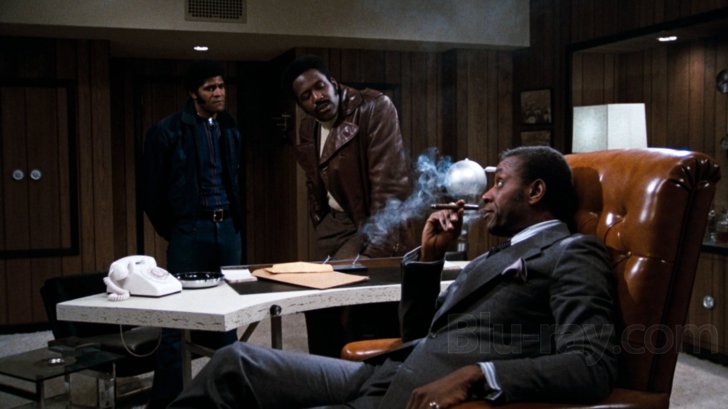
In 2000, the Library of Congress selected Shaft for inclusion in the National Film Registry. The film's stature has grown with time, especially in comparison to many of the blaxploitation films that followed. In his original review, Roger Ebert noted that director Parks didn't seem entirely comfortable with the down 'n' dirty world of the private eye genre, and he had a point. Parks was clearly most attracted to the honorable side of John Shaft. He left it to Roundtree and Hayes to supply the grit. For the more typical blaxploitation film, one need look no further than the following year's Super Fly (directed, ironically, by Gordon Parks, Jr.) in which Roundtree's tough, upstanding detective was replaced by Ron O'Neal's equally tough, but far from upstanding, coke dealer. Shaft stands apart from the pack, and this Blu-ray presents him better than most saw him in 1971. Highly recommended.
Similar titles
Similar titles you might also like

Shaft's Big Score!
Warner Archive Collection
1972

The Connection
La French
2014

Across 110th Street
1972

The Stone Killer
Limited Edition to 3000
1973

Year of the Dragon
Warner Archive Collection
1985

The Big Heat 4K
1953

Night Moves 4K
1975

Run All Night
2015

I Confess
Warner Archive Collection
1953

Mulholland Falls
1996

Kiss Me Deadly
1955

711 Ocean Drive
1950

Pickup on South Street
1953

Dead or Alive
1999

Max Payne
2008

Premium Rush
2012

New World
신세계
2013

Everly
2014

Sweet Sweetback's Baadasssss Song
1971

Superfly
2018

